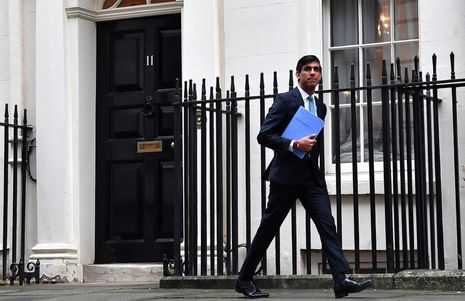The collapse of the foreign aid consensus should worry us all
Joseph Venable details how the UK’s commitment to universal solidarity, expressed by its pledge to foreign aid, is being eroded by the current government.

Earlier this year George Saunders, arguably America’s best living writer, published a new short story. It imagined a future America where a tyrannical ruler had imposed heavy surveillance, dismissed unfriendly judges and militantly targeted immigrant communities. Perish the thought, of course, that Saunders had any present-day politician in mind when he wrote it.
The story’s narrator looks mournfully back at the start of the repression, and realises his passivity at the time was based on a presumption that things would shortly return to ‘normal’: “It did not seem… that someone so clownish could disrupt something so noble and time-tested and seemingly strong, that had been with us literally every day of our lives. We had taken, in other words, a profound gift for granted. Did not know the gift was a fluke, a chimera, a wonderful accident of consensus and mutual understanding.”
I find this passage, damp with human regret, somewhat chilling. Having lived largely in the 21st century, I have no memories of high-profile racists like Peter Griffiths or Enoch Powell; the political discourse I grew up with was relatively respectful, organised around the kind of ‘consensus’ Saunders is describing. The notion that this civility is a sort of miracle – ‘a fluke, a chimera’ – is scary: the possibility that behind this happy construct lies a reality, of unveiled vitriol and anger and violence, waiting to burst forth.
This week, a little of this ugliness leaked through. As far as my memory stretches, there’s been a consensus that we should give 0.7% of our GDP to support the world’s poorest countries. So small is the amount, and so great is Britain’s wealth compared to these countries, that the policy can hardly be called controversial. In the last four general elections, all three main parties have stood on a pledge to continue this funding. Where the worst instincts of humankind might have cajoled politicians to be more selfish, to spend the money in Britain instead, belief in this chimera held true. Until last month, when Rishi Sunak revealed the government would cut the spending, stripping 13 million pounds a day from the world’s poorest nations – just as they need it the most.
“If we believe in the dignity of individuals, in people’s basic rights to access healthcare and education, in the idea that your life chances shouldn’t be determined by where you’re born, we have to believe in spending money overseas”
I have not seen anyone effectively justify this change. It’s callous and selfish. If you walk past a person who’s drowning and you have a rope, you should throw it. If children are dying of diarrhoea in sub-Saharan Africa, and you can dramatically ease their pain with less than one percent of your annual income, you should do it. If we believe in the dignity of individuals, in people’s basic rights to access healthcare and education, in the idea that your life chances shouldn’t be determined by where you’re born, we have to believe in spending money overseas. It is impossible to argue in human terms with foreign aid – hence its opponents always resort to abstractions, like ownership, nationhood and consent. Meanwhile, lives are lost.
The chimeric foreign aid consensus – so delicately constructed through years of public awareness-raising about global poverty, Live Aid and Oxfam and Comic Relief – has collapsed in a twinkle of Rishi Sunak’s eye. One estimate suggests the cut will cause 100,000 deaths – even if they’re out by a power of ten, we are still looking at a devastating death toll. Resurrecting this chimera will likely be a long and difficult road. We may do better seeking to protect what remains: what other chimeras survive in British politics? One is political correctness, which to my mind is merely a form of politeness – the idea that we conduct public discourse without resorting to racial slurs, homophobia, or the demeaning of women. The Prime Minister has already made great strides in his newspaper columns towards the butchering of this ideal - like any chimera, if people stop believing in it, it ceases to exist. How long can it bear up?
“We may do better seeking to protect what remains: what other chimeras survive in British politics?”
Some of the chimeras go way back. We have a general, common-decency principle of allowing people fleeing war to apply for asylum here, going back at least to our signature on the 1951 Refugee Convention; this has been severely strained under the current government. The chimera of access to justice, with the state paying to cover legal fees for those who can’t pay for representation themselves, has more or less perished under persistent slashes to legal aid. It is hard not to wonder whether Britain’s belief in free nationalised healthcare can hold up much longer.
Am I being over-dramatic? Last year a survey found two-thirds of Brits considered overseas aid ‘a major priority’. Every serious political party went into the election backing the 0.7% target. How could it have gone? All it takes, it transpires, is one lousy politician, backed by a big parliamentary majority and a slavishly uncritical press. It is a bad time to be huddled under the wings of a chimera.
 News / Uni Scout and Guide Club affirms trans inclusion 12 December 2025
News / Uni Scout and Guide Club affirms trans inclusion 12 December 2025 News / Pembroke to convert listed office building into accom9 December 2025
News / Pembroke to convert listed office building into accom9 December 2025 Features / Searching for community in queer Cambridge10 December 2025
Features / Searching for community in queer Cambridge10 December 2025 News / Uni redundancy consultation ‘falls short of legal duties’, unions say6 December 2025
News / Uni redundancy consultation ‘falls short of legal duties’, unions say6 December 2025 News / Gov declares £31m bus investment for Cambridge8 December 2025
News / Gov declares £31m bus investment for Cambridge8 December 2025









